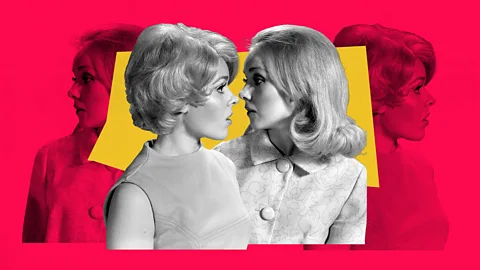Why your most attractive qualities can give your partner 'the ick'

 Javier Hirschfeld/ Getty Images
Javier Hirschfeld/ Getty ImagesThe qualities that make us stand out the most, and the main reasons that people find us attractive, can be a blessing and a curse. Sometimes our most appealing traits can become a reason for a breakup.
"The ick" was one of the more unusual words to be added to the Cambridge Dictionary in 2024. The phrase describes the feeling of suddenly seeing something about a partner in a new light, and finding it so unattractive it can't be unseen. Once you have the ick, it is unfortunately incurable.
While the phrase might be intended in a lighthearted manner, it shows that there can be unattractive qualities about a partner that are not immediately obvious. In fact, we might have found those qualities really attractive earlier in the relationship. This is called "fatal attraction" – when a person comes to dislike aspects of a partner that they were initially attracted to. "It doesn't mean fatal in the sense of deadly, but fatal as in the sense of prophetic," says Diane Felmlee, a social psychologist from Penn State University in the US.
"I like to think of it as having 'too much' of an attractive quality," she says. "Disenchantment with a partner can occur even when people get what they want, and perhaps because they get what they want."
During her own research, Felmlee asks people for reasons they were first attracted to a partner, why they became dissatisfied and why past relationships ended. Most people listed various needs that were not being met by their ex-partner as a cause for a breakup. But Felmlee noticed some of those missed needs were related to reasons they were attracted to an ex-partner in the first place.
"It is a different interpretation of the same quality," she says. "It's a negative way of looking at a positive trait. I have an example here of someone who said they were attracted to their partner because she was considerate. And then they complained that she said 'sorry' too much. Well, that sounds pretty considerate."
Other examples identified by Felmlee include being attracted to someone with a high-powered job, only to find that they spend too long at work, or finding a partner funny, but then complaining that they don't take life seriously. Easygoing, laid-back partners became flaky or never on time. "Easygoing is great, as long as you're punctual," says Felmlee with a laugh.
Likewise, partners who are at first judged to be powerful or strong become controlling or overbearing after a breakup. People who are nice become pushovers. Successful people become workaholics.
With fatal attraction, the stronger the initial attraction to a particular characteristic, the more likely it is to become a reason for a breakup. Why might it be that big positives end up being dealbreakers?
First, it could be that the things we first notice about new partners, or potential partners, are the extreme qualities that make them stand out. "We don't describe partners as 'kind of helpful', or 'a little hard working'," says Felmlee. "And the more extreme it is, the more likely people are to dislike those qualities later."
There might be an element of naivety too, adds Felmlee – our initial infatuation temporarily blinds us to the potential downsides of a very extreme characteristic. But after the initial excitement subsides, we become more aware of how those characteristics might have a negative effect.
This reevaluation can happen subtly over time. Fatal attraction might be a slow, dawning realisation rather than a drastic reversal in judgment as with the ick. Couples that have been together for between 10 and 21 years have the lowest levels of relationship adjustment, meaning that they find it harder between these ages to resolve conflicts, adjust to new challenges or change their expectations towards their partner.
 Javier Hirschfeld/ Getty Images
Javier Hirschfeld/ Getty ImagesIt is important to reevaluate relationship satisfaction because it is a predictor for many aspects of life, according to Samantha Joel, a psychologist at Western University in Ontario, Canada. People in unhappy relationships have poorer physical health, higher blood pressure, are at higher risk of poor mental health and have worse work-life balance, among many other problems.
A simple measure of relationship satisfaction, called social exchange theory, can be made by comparing the rewards we receive from being with a partner, such as how much fun we have, if they make us feel prized, their beauty or money, against the costs, such as conflicts, the potential to be hurt or financial investments. There are two ways that people use social exchange theory – firstly by comparing a current relationship to past ones. We will find a relationship less satisfying if it falls below the standard that we expect based on past experiences. The other comparison we might make is with other options available to us currently. We might reject potential partners, even if we think the signs may be promising, if we feel we might have better odds with other people.
Those calculations will be different for everyone. Same-sex couples, for example, are likely to face higher relationship costs because of discrimination and homophobia. Depending on where you live, you might have fewer dating options available to you too.
So, are we better off being drawn to a middle-of-the-road partner with fewer extremes? "I don't think so," says Felmlee. "It is probably a better bet to look for someone with similar extremes to us rather than average qualities."
Couples that are similar in some key traits are more likely to be successful. Looking at a pool of 79,000 British couples, the strongest indicator for relationship satisfaction is being a similar age. But other demographic factors, including education, and some other things like religious or political beliefs and substance use are also strong predictors for relationship success. There are also smaller but still significant correlations between biological factors like being a similar height and BMI.
"We found particularly high correlations for things like beliefs and values, educational attainment, and certainly substance use," says Tanya Horwitz, a doctoral student at the University of Colorado Boulder in the US. Similarity seems to be strengthening, but dissimilarity only seems to be a problem in certain circumstances. "A smaller minority showed any sign of a negative correlation," she says. One example which did seem to matter was that morning people really don't seem to be compatible with evening people, and vice versa.
 Javier Hirschfeld/ Getty Images
Javier Hirschfeld/ Getty ImagesHorwitz says that two very different people might still find themselves attracted to each other initially, but they are less likely to be successful long-term. The couples in her study were older, cohabiting, married or co-parenting. "These were generally people who are in quite serious or long-term relationships, and I think it really says more about what makes for a long-term union, than what makes for an initial attraction," she says.
Felmlee caveats that fatal attraction doesn't have to be terminal for a relationship. Partners who share similarly strong characteristics might do OK. "Studying fatal attraction, it's less common for people to complain about the similar qualities that they say they have in themselves," she says.
One of her interviewees, an older man, said he was first attracted to his wife because of the strength of her character and her confidence. The downside, he said, is that she could sometimes be stubborn. "But they're still married," says Felmlee. "So what's going on? He also showed an awareness of himself and admitted he could be stubborn too. That was really sweet."
--
If you liked this story, sign up for The Essential List newsletter – a handpicked selection of features, videos and can't-miss news, delivered to your inbox twice a week.
